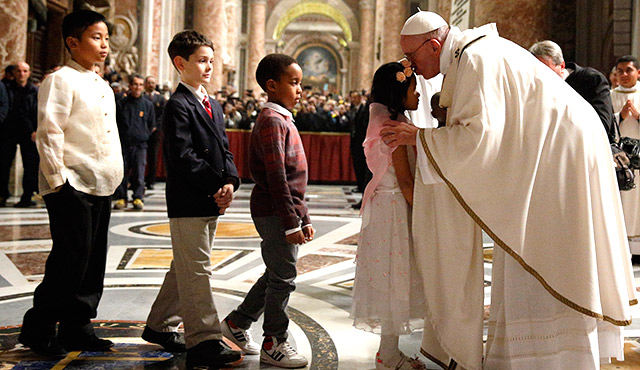Before the age of 8, Catholic children are bestowed three of the seven sacraments.
There’s the first sacrament, baptism. For parents, perhaps the hardest part of introducing a child to baptism is dealing with a baby that may squirm and cry as holy water is cascading down his or her head.
But introducing confession and Communion at the age of 7 or 8 – when most children will receive those two sacraments – can be a more daunting task for parents. At this age, most children are still learning to understand the concept of time and space and are just starting to enjoy reading a book by themselves.
With that in mind, how can parents prepare young children for what is considered a profound spiritual concept: a Christian rite that serves as a visible form of grace?
The key to approaching the sacraments is teaching it as an opportunity to be closer to Jesus Christ, says Katie Dawson, director of Parish Faith Formation for the Diocese of Orange.
“The occasions of First Reconciliation (also referred to as First Penance or First Confession) are moments of opportunity for children to truly encounter Jesus,” she says. “And that’s the goal of our catechetical preparation – to assist the child, to prepare the child to recognize Jesus present to them in these sacraments.”
Children have an innate, built-in spiritual sense and are often more easily aware of God’s presence than adults, Dawson says.
“We want to encourage them in that awareness,” she says. “God is inviting them to a deeper relationship with Him through the Eucharist and through the Sacrament of Reconciliation and it is that friendship that should be emphasized.”
The ritual of practicing the sacraments of confession and Communion for the first time can create some nervousness for children, whether it is approaching a priest with the appropriate words once he or she is in the confessional or deciding how to accept the Eucharist.
But parents and teachers can help manage that anxiety by emphasizing the exciting, loving relationship into which God has invited them, Dawson says.
“An overemphasis on ‘doing things the right way’ – i.e. processing, bowing, the words that need to be said – can increase anxiety,” she says. “While the externals are important, they need to be understood in the context of this wonderful meeting with God that we are preparing for.”
To help children have a successful confession, CatholicCulture.org suggests that children need to be taught why they have sinned to avoid “teaching our children a list of sins that they recite in a ‘respectable’ way. Such practice reduces the sacrament to a formula.”
With Communion, parents can point out how the Holy Eucharist nourishes the soul the way food in general sustains the body.
The most important thing that parents can do to help their children in preparing for the sacraments and beyond is for parents to fully participate in receiving the sacraments and to nurture their own friendship with Jesus and with God, Dawson says.
“The core message of sacramental preparation (for any of the sacraments) is that an infinitely-loving God loves each of us infinitely and invites us into an intimate relationship with him, into deep friendship with him,” she says. “Focusing on that reality and spending some time and energy on our own relationship with God is what will help our children most. This provides an authentic model for the relationship we propose to the child.”

